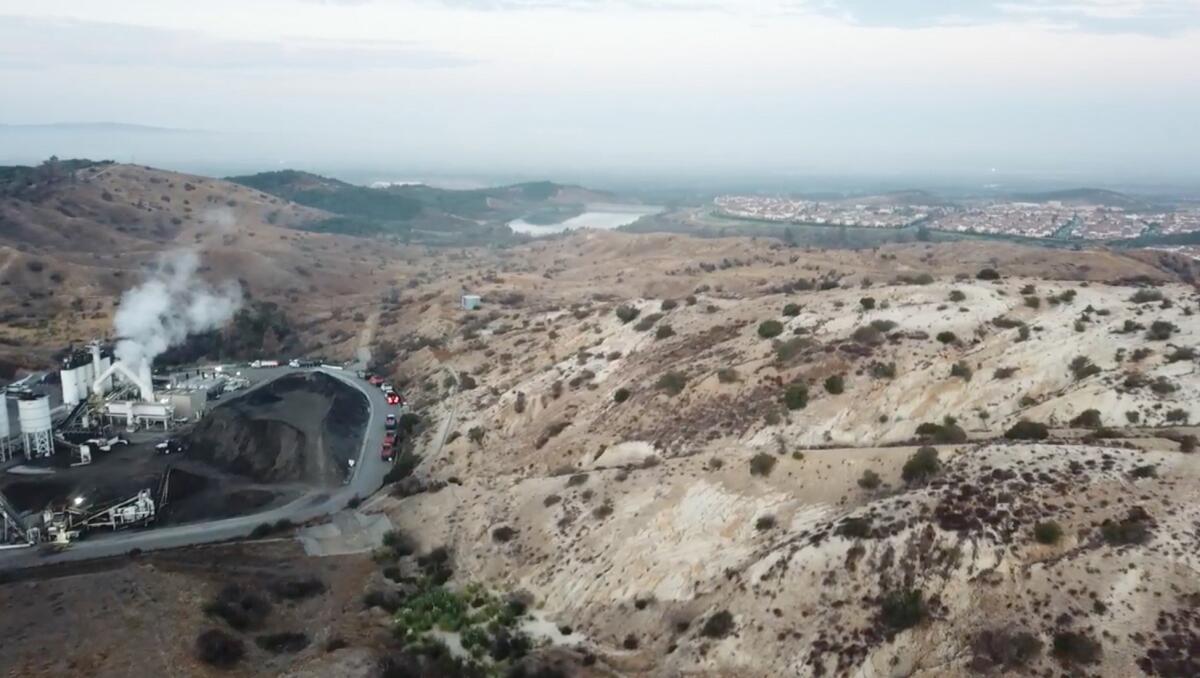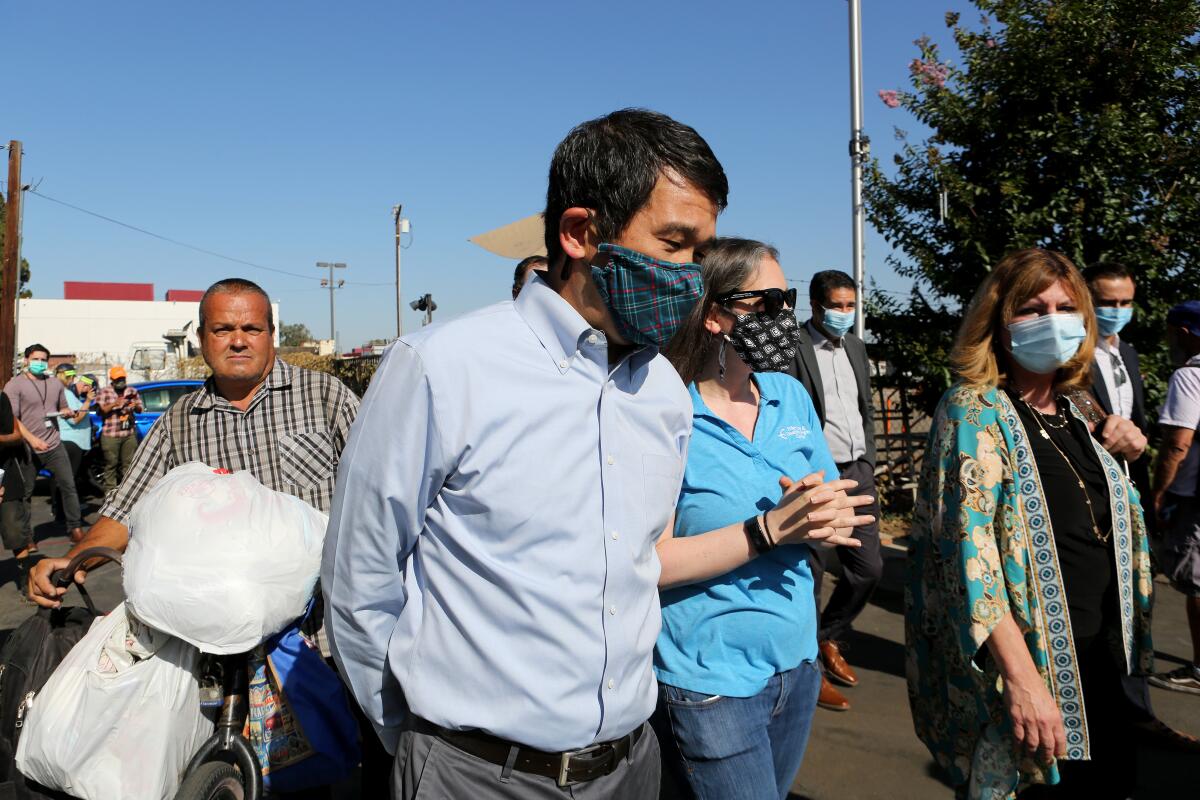Irvine may consider regulating asphalt plant that residents say spreads toxic fumes into the air

North Irvine residents have been complaining for years of potentially toxic fumes and foul smells coming from an asphalt facility near their homes.
They’ve claimed that the All American Asphalt plant, located near Orchard Hills, harms their health, causing troubling respiratory symptoms and possibly contributing to future chronic illnesses.
For a long time, they felt that their voices were falling on deaf ears.
The city responded last year by filing a lawsuit against the asphalt plant, claiming it’s in violation of air quality regulations and local public nuisance provisions. Then in response to pressure from residents, the South Coast Air Quality Management District, a regional air quality regulator, chose to conduct further testing of the site, and the city of Irvine hired contractors for further testing.
But to the dismay of residents, the investigations found no toxic health concerns from the asphalt plant. Meanwhile, they still report bad smells and health issues.
Earlier this year, residents filed a separate lawsuit against All American Asphalt and have criticized the SCAQMD and contractors for using faulty testing methods during their air quality investigations.
After years of advocacy for the cause, calling out the city for inaction and pressing for a public airing of the issue, residents may be making some headway. The issue was finally heard in a public venue last week at a City Council meeting, and the discussion caught the attention of a powerful voice in state and local politics, state Sen. Dave Min.
Min sent a letter to the city, conveying to local leaders that he is looking to work with Irvine “to take all necessary actions to mitigate this problem that is so detrimentally impacting the quality of life of so many Irvine residents.”
“As we know, there are two separate issues when it comes to noxious fumes such as the kind created by All American Asphalt,” Min said in his letter. “First, there is the concern that these fumes may be tied to toxic emissions that negatively impact air quality to the point where there is a public health concern. Second, there is concern that such fumes, simply by virtue of their strong and noxious odors, may create an unacceptable nuisance to those impacted by them, negatively impacting their mental health and wellbeing.
“I would note that these concerns are independent of one another. That is to say that whether or not a particular polluter is violating the state’s air quality standards is not the same questions as whether that polluter is creating an odor nuisance that harms the wellbeing of its neighbors.”
The council seems willing to work with Min.
“We could certainly use the senator’s help in a lot of this,” Vice Mayor Tammy Kim said during the meeting.

Council members discussed a few ways to regulate the asphalt plant’s trucks, which have been seen uncovered and driving through neighborhoods, spreading fumes in residential areas.
Mayor Farrah Khan said she would like the council to revisit at its next meeting on Sept. 28 the idea of setting a policy to enforce the covering of trucks and to have ongoing monitoring so trucks are not traveling through residential neighborhoods.
Khan also said she would like the current air quality reporting system to be modified.
“The current process of reporting definitely seems to be very cumbersome on the part of the residents,” Khan said. “Six people have to call in and complain before the issue is registered, and then someone has to be home for an inspector to actually test the air. How do we move away from this archaic system into something where a person calls and says that they’re smelling something, and you have monitors out there that can automatically be turned on and capture data in real time?”
A representative of SCAQMD said having multiple people report one episode before responding to a scene of an odor is required under state law. Kim said she hopes Min can help advocate for a change to that law.
Those changes aren’t enough for Councilman Larry Agran, who said the All American Asphalt plant needs to be shut down.
“I think we have to face up to the fact that one way or another, this plant sooner rather than later, has to be shut down and removed to an appropriate place where production of asphalt can take place safely,” Agran said. “That’s a heavy lift.”

In response to a question from Kim, City Atty. Jeffrey Melching said the city doesn’t have any regulatory power to close the plant or move it to another location.
Councilman Mike Carroll expressed interest at the meeting in collaborating with retired UC Irvine professor Dean Baker, who has worked with residents and Non-Toxic Neighborhoods, a community group that has been leading the effort against All American Asphalt.
Baker has been critical of the methods used in the air quality studies. During his presentation at the council meeting, Baker said that the investigations had their limitations, including not enough sampling, the use of low-cost sensors and a failure to test for all volatile organic compounds, or VOCs.
“But the bottom line is, the problems, the odors, the symptoms continue,” Baker said.
Kim Konte, founder of Non-Toxic Neighborhoods, spoke out against the city during the meeting. Konte has mentioned in the past that she fears for the health of her children, like many neighbors who live near the asphalt plant.
“We can’t open our windows at night, and the noxious asphalt and chemical odors constantly flood North Irvine,” Konte said. “... The city of Irvine is the last line of defense for its residents, and the city is failing our children. Our elected officials need to take ownership of this public health crisis.”
All American Asphalt did not respond to a request for comment.
All the latest on Orange County from Orange County.
Get our free TimesOC newsletter.
You may occasionally receive promotional content from the Daily Pilot.




